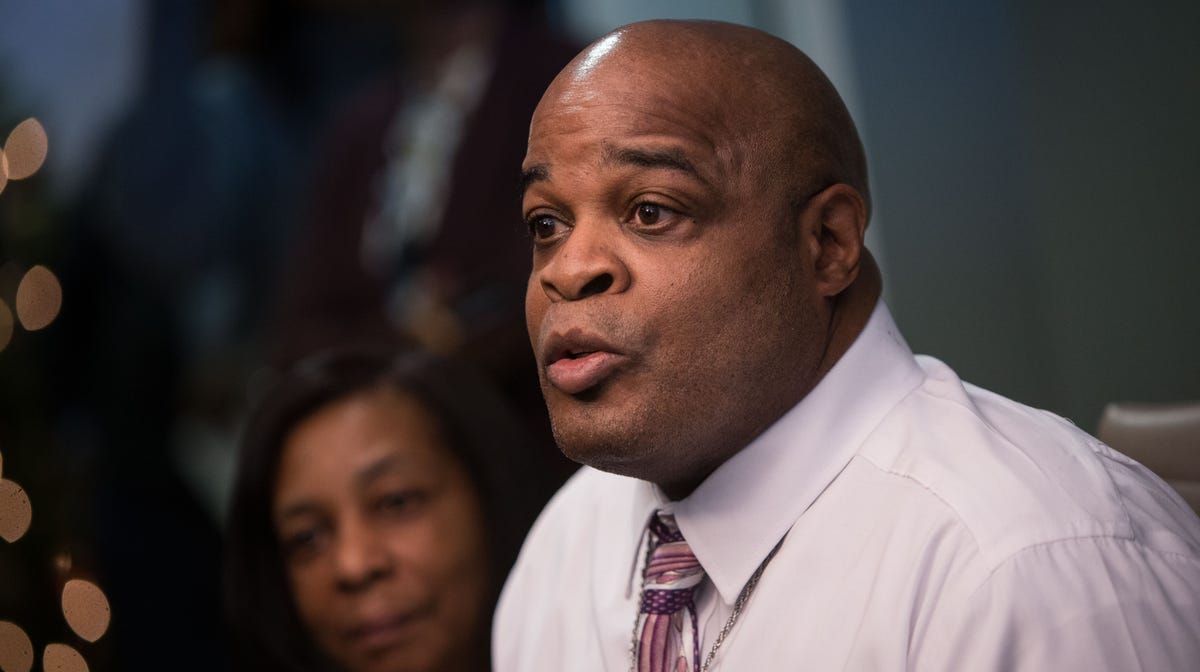Delaware
Delaware Republicans seek to limit governor's ‘unfettered’ powers

(The Center Square) — Delaware Republicans seek to limit the governor’s “unfettered” powers by requiring more legislative oversight and setting limits on emergency declarations.
One proposal filed by the Assembly’s GOP minority would require the Legislature to create a new joint committee on Oversight of Agency Regulations and enhance lawmakers’ oversight of new regulations.
Another would require the Legislature to reauthorize emergency declarations — such as those set by Democratic Gov. John Carney during the COVID-19 pandemic — every 180 days.
A summary of the bill says it intends to “require the legislative branch to reasonably restrict or confirm the executive branch in its exercise of emergency powers, thereby maintaining a balance or separation of powers between the executive and legislative branches of state government.”
“State regulations can carry the weight of law, placing new restrictions, burdens, and costs on Delaware citizens, but Delawareans have virtually no ability to impact the regulatory process,” said state Rep. Jeff Spiegelman, R-Townsend, the bill’s primary sponsor. “While state agencies are required to publish pending regulations and solicit feedback, they are not compelled to make any changes in their proposals, regardless of public opinion.”
Sen. Dave Wilson, R-Cedar Creek Hundred, said the bill recognizes the need for the governor to act quickly in the event of an emergency or disaster but sets limits on that authority.
“If an emergency lasts more than 180 days, this bill would require the legislature to approve extensions of the governor’s state of emergency order,” Wilson said in a statement. “Through their legislators, citizens would have a voice in the renewal of emergency orders and the mandates they contain.”
Lawmakers cited a recent decision by the Delaware Department of Natural Resources and Environmental Control to set new regulations restricting the state’s sale of fuel-powered cars, trucks and SUVs.
Those rules require vehicle manufacturers to sell an increasing percentage of new zero-emission passenger cars and light-duty trucks in model years 2026 through 2035.
State environmental officials say the rules will lead to more zero-emission vehicles on the road in Delaware, reducing gasoline and diesel fuel consumption and maintenance costs due to more fuel-efficient vehicles.
But Republicans have pushed back hard against the proposed regulations, arguing the changes would be an unfunded mandate on the state’s consumers, forcing them to buy expensive electric vehicles.
Senate Republican Whip Brian Pettyjohn, R-Georgetown, has filed a bill that would block state agencies from setting similar setting regulations without public legislative input. He said the implementation of the EV regulations illustrates the need for limits on executive powers.
“The regulation was finalized despite overwhelming opposition to it,” he said. “When elected leaders display such a high level of disregard for the people they are supposed to be serving, it’s clear the system is dysfunctional and in dire need of reform.”

Delaware
Why Delaware is one of the few states that doesn’t compensate wrongfully incarcerated

‘Long time coming’ Delaware man released after 39 years in prison
57-year-old Elmer Daniels released from prison after 39 years after state dismisses rape indictment.
John J. Jankowski Jr. and Daniel Sato, Delaware News Journal
When Elmer Daniels left Delaware prison 39 years after a court ruled in 2018 that he was wrongfully convicted, he was turned out into the world in the middle of winter with little more than the shirt on his back, according to his attorney.
That’s because Delaware is one of about a dozen states that has no mechanism to compensate individuals who wrongfully spent portions of their lives locked behind bars. These are people who spent years, or in some cases, decades making no real money in prison as the world and their connections on the outside have moved on without them.
Once again this year, some Delaware lawmakers want to create a compensation program to acknowledge the unfairness of being wrongfully locked up. Senate Bill 169 is the latest effort to do that.
The bill has passed a Senate committee. It’s main sponsor, Kyra Hoffner, a Smyrna Democrat, said she is revising the bill and hopes it will be up for a vote in the Senate in the coming weeks.
How would it work?
The proposed program has been revised multiple times, but Hoffner explained how the program would work.
The bill would set up a compensation fund for individuals whose convictions were overturned and either dismissed, dropped or retried resulting in an acquittal. These situations most commonly occur when people locked up work for years to present to the court flaws in their original conviction and in some cases, new evidence pointing to their innocence.
In some cases, like the situation faced by Mark Purnell in recent years, the courts can overturn someone’s conviction, and prosecutors, who often have the choice of whether to retry or drop the case, will dangle freedom in front of the individual if they plea to a lesser crime.
So people who also plead no-contest after their conviction is overturned and remanded for further proceedings are also eligible to apply for compensation. Purnell’s case was ultimately dropped by prosecutors. He spent 16 years wrongfully locked up.
Released: Mark Purnell, who spent 16 years in prison due to unjust trial, suddenly released
The legislation includes protections to disqualify people convicted of other crimes tied to the overturned conviction or people who purposefully take the blame for someone else in a criminal case. People who have a conviction the court has not deemed illegitimate and who are simply pardoned would not be eligible, Hoffner said.
Those who qualify would be allowed to file a court petition seeking compensation. It would be up to them to make a showing to the court of their innocence, Hoffner said. This showing would be judged by what’s called a “preponderance of the evidence,” a lower standard than the ”beyond-reasonable-doubt” standard used to convict people, she said.
Prosecutors in the Delaware Department of Justice would have the opportunity to refute and present evidence in opposition to the person’s claim.
James Moreno is the executive director of the Delaware Innocence Project, a nonprofit that investigates and pursues claims of wrongful incarceration. He emphasized that it’s only fair for the state to help people when they’ve taken away their time and freedom unfairly.
“Nobody is saying let’s hand out a pot of money; there is a standard that must be met and it is about fairness,” Moreno said.
How much money are we talking about?
Individuals who clear the court hurdle will be eligible to receive compensation based on their years spent wrongfully behind bars and a few other factors.
Those who served time on death row are eligible for $100,000 for each year wrongfully locked up. Those who served time off death row, which is most people who would qualify, would be eligible for $75,000 per year.
Those wrongfully put on probation or those paroled after a wrongful conviction or people wrongfully made to register as sex offenders would be eligible for $50,000 for each year in the system, Hoffner said.
The bill also includes provisions to help cover attorneys fees, reimbursement of restitution a person was wrongfully ordered to pay as well as reimbursement for “reintegrative services” like mental and physical health care costs incurred between the person’s release and their grant of compensation, Hoffner said.
The bill includes provisions that would tie the compensation award in the future to changes in inflation as well as timing the disbursement of payments to those who qualify. The fund would be managed by the state treasurer.
How often does this happen?
It is rare for people to have their cases overturned in Delaware. People in prison typically don’t have money so it’s not an incentivized area for private attorneys to work in. That’s the gap that the Delaware Innocence Project, a relatively new organization compared with counterparts in other states, seeks to help fill.
According to the National Registry of Exonerations, four people in Delaware have successfully overturned their convictions in the past 35 years. Those include Daniels, Isaiah McCoy, Mark Purnell and James Dollard.
Hoffner said Daniels, Purnell and Dollard would qualify under the bill’s current format.
‘Left to fend’ for themselves
When a person is imprisoned, they make little to no money, their marketable skills diminish, they fall behind current technology and lose personal connections and family foundations.
Then, when their conviction is overturned, they are released into a world with new technology, high basic prices to survive and, in the eyes of many potential employers, a black mark of having just recently been released from lockup.
Hoffner added that incarceration also exacerbates one’s health problems. She said the money can’t give someone back their time, but will make their life a bit easier.
“Everyone thinks life goes back to normal,” Hoffner said. “But it is a big struggle.”
Emeka Igwe, Daniels’ attorney, emphasized the difficulty of reintegrating into society after being released for so long.
“There was nothing from the state at all,” Igwe said. “He was basically left to fend for himself.”
Daniels released: Flawed testimony led to his conviction 39 years ago. Now, prosecutors say he can go free
The office of Delaware Attorney General Kathy Jennings did not comment on the proposed legislation when asked. Leadership in Delaware’s judiciary declined to comment.
The legislation is not a new push in Delaware. In 2019, a similar bill was introduced, passed through a House committee and died without House Democratic leadership bringing it up for a vote.
Lawsuits often fruitless
Supporters say another common misconception is that civil courts allow wrongfully convicted people to seek damages. Daniels’ case is an example of how that often isn’t the case.
The courts provide broad civil immunity to police and prosecutors carrying out their work administering justice.
Daniels sought compensation via a civil lawsuit. His rape conviction was overturned because some of the basic evidence underpinning his case was based on science that society now regards as unreliable as well as other evidence that undercut his original prosecution. After his case was remanded, prosecutors said they couldn’t label him “innocent,” but dropped the case. He was 57 when he was released from prison.
Earlier this year, a judge dismissed his lawsuit against Wilmington police after he failed to meet the high legal bar that officers knowing or willfully violated his constitutional rights.
“Courts cannot right all wrongs” was the opening line in Judge Stephanos Bibas’s opinion dismissing the lawsuit.
Igwe, Daniels’ attorney, said he is appealing the ruling. He said Daniels has acclimated to life and work outside, but is owed a debt by those that took 39 years from him.
“He was incarcerated in the name of the state,” Igwe said. “He should be compensated by the state.”
Jon Eldan is the founder and executive director of After Innocence, a California-based nonprofit that, among other things, advocates for such compensation programs. He said Daniels’ situation is common to people released after a wrongful conviction: The law in America often provides no route for compensation through civil courts.
“There have been several thousand cases overturned throughout the country,” Eldan said. “The majority of people don’t have a lawsuit.”
Contact Xerxes Wilson at (302) 324-2787 or xwilson@delawareonline.com.
Delaware
Delaware County Council votes to fire director of emergency services

MEDIA, Pa. (CBS) — Delaware County Council voted to terminate Director of Emergency Services Tim Boyce on Friday.
The council said the decision was based on information from multiple sources regarding unacceptable behavior in the workplace.
Part of a statement from a county spokesperson said, “County council is committed to protecting our workforce and part of that commitment is ensuring a fair and thorough examination of any complaints or allegations made by our county team.”
Below is the full statement from the Delaware County spokesperson.
“On May 10, Delaware County Council voted to terminate Director of Emergency Services, Tim Boyce. The decision was based on information developed from multiple sources regarding unacceptable behavior in the workplace.
Mr. Boyce was placed on leave on April 26 due to allegations of gross misconduct. Since that time, the County gained sufficient information to terminate Mr. Boyce. While we typically do not comment on personnel matters, this issue has received significant public attention. To assure any concerns regarding public safety, we are providing this update. Deputy Director Ed Beebe will continue to lead the Department of Emergency Services, ensuring the continuity of services and resources provided to protect public safety.
County Council is committed to protecting our workforce and part of that commitment is ensuring a fair and thorough examination of any complaints or allegations made by our County team. The safety and security of every County employee is a vital priority of County Council and County management. Harassment, discrimination, and retaliation are not tolerated at the County and Council is committed to ensuring that the work environment is safe for all county employees. We appreciate and support the critical work of our dedicated Public Safety Staff. The County is working with their management team to provide needed resources as they deal with this challenging situation.”
Delaware
Brilliant Northern Lights were seen in Delaware Valley and there's still another chance

-

 News1 week ago
News1 week agoPolice enter UCLA anti-war encampment; Arizona repeals Civil War-era abortion ban
-

 News1 week ago
News1 week agoSome Florida boaters seen on video dumping trash into ocean have been identified, officials say
-

 Education1 week ago
Education1 week agoVideo: President Biden Addresses Campus Protests
-

 World1 week ago
World1 week agoUN, EU, US urge Georgia to halt ‘foreign agents’ bill as protests grow
-

 World1 week ago
World1 week agoEuropean elections: What do voters want? What have candidates pledged?
-

 World1 week ago
World1 week agoIn the upcoming European elections, peace and security matter the most
-

 Movie Reviews1 week ago
Movie Reviews1 week agoSabari Movie Review: Varalaxmi Proves She Can Do Female Centric Roles
-

 Politics1 week ago
Politics1 week agoAustralian lawmakers send letter urging Biden to drop case against Julian Assange on World Press Freedom Day



















